

- Jaeyoung Kim, Seoul Nationl University
- Sihyeon Lee, Seoul Nationl University
- Hyeon Jeon, Seoul Nationl University
- Keon-Joo Lee, Korea University Guro Hospital
- Bohyoung Kim, Hankuk Foreign Language University
- Hee-Joon Bae, Seoul National University Bundang Hospital
- Jinwook Seo, Seoul National University
Acute stroke demands prompt diagnosis and treatment to achieve optimal patient outcomes. However, the intricate and irregular nature of clinical data associated with acute stroke, particularly blood pressure (BP) measurements, presents substantial obstacles to effective visual analytics and decision-making. Through a year-long collaboration with experienced neurologists, we developed PhenoFlow, a visual analytics system that leverages the collaboration between human and Large Language Models (LLMs) to analyze the extensive and complex data of acute ischemic stroke patients. PhenoFlow pioneers an innovative workflow, where the LLM serves as a data wrangler while neurologists explore and supervise the output using visualizations and natural language interactions. This approach enables neurologists to focus more on decision-making with reduced cognitive load. To protect sensitive patient information, PhenoFlow only utilizes metadata to make inferences and synthesize executable codes, without accessing raw patient data. This ensures that the results are both reproducible and interpretable while maintaining patient privacy. The system incorporates a slice-and-wrap design that employs temporal folding to create an overlaid circular visualization. Combined with a linear bar graph, this design aids in exploring meaningful patterns within irregularly measured BP data. Through case studies, PhenoFlow has demonstrated its capability to support iterative analysis of extensive clinical datasets, reducing cognitive load and enabling neurologists to make well-informed decisions. Grounded in long-term collaboration with domain experts, our research demonstrates the potential of utilizing LLMs to tackle current challenges in data-driven clinical decision-making for acute ischemic stroke patients.
- https://osf.io/q6yc4/